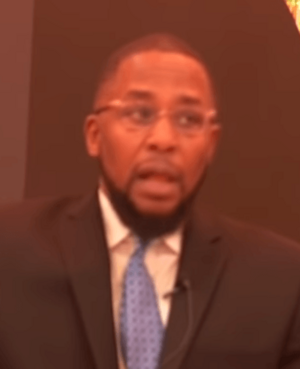Malik Zulu Shabazz facts for kids
Quick facts for kids
Malik Zulu Shabazz
|
|
|---|---|

Shabazz in 1994
|
|
| Born |
Paris S. Lewis
September 7, 1966 Los Angeles, California, U.S.
|
| Nationality | American |
| Education | Howard University (B.A., J.D.) |
| Occupation | Lawyer, political activist, lecturer |
Malik Zulu Shabazz was born as Paris Lewis on September 7, 1966. He is an American lawyer. He used to be the leader of the New Black Panther Party. Since 2013, he has been the National President of Black Lawyers for Justice, an organization he helped start.
In October 2013, Shabazz announced he was stepping down from his leadership role in the New Black Panther Party. He is sometimes a guest on television talk shows.
Organizations like the Anti-Defamation League and the Southern Poverty Law Center (SPLC) have described some of Shabazz's past statements as very strong and controversial. The SPLC monitors groups and individuals they consider extreme.
Contents
Early Life and Legal Career
Shabazz was born in Los Angeles in 1966. He has said his father, James Lewis, was a Muslim who passed away when Shabazz was a child. His mother, who he describes as a successful businesswoman, raised him. His grandfather, who introduced him to the Nation of Islam, also had a big influence on him.
Education and Early Work
Shabazz studied at Howard University and later at Howard University School of Law. In 1994, he worked for the Mayor of Washington D.C., Marion Barry. However, he was let go because of statements he made that the Mayor felt did not match his views.
In 1995, while still a law student, Shabazz tried to get a seat on the Council of the District of Columbia but was not successful. In 1996, he started Black Lawyers for Justice. In 1998, the National Bar Association, a leading group for Black lawyers, named him "Young Lawyer of the Year." He ran for the D.C. Council again that year but did not win.
Fighting for Justice
In 2007, Shabazz led a large march and rally in Charleston, West Virginia. This event called for justice for Megan Williams, a young Black woman who had been harmed. Shabazz and his organization, Black Lawyers for Justice (BLFJ), organized the event. Many other Black organizations and student groups supported it.
More recently, Shabazz supported victims of a serious incident involving law enforcement officers in Rankin County, Mississippi. Along with another lawyer, Trent Walker, Shabazz filed a lawsuit for Michael Corey Jenkins and Eddie Terrell Parker. These two Black men were harmed by deputies from the Rankin County Sheriff’s Department. The lawsuit is still ongoing, seeking a large amount of money for the victims.
The police officers involved in this incident were later sentenced to many years in prison. Six officers received sentences totaling over 132 years. These were some of the longest sentences ever given to police officers in U.S. history. After the officers admitted their guilt, Shabazz stated that the Rankin County Sheriff’s Department had serious problems. He also mentioned that the Department of Justice was looking into the matter further.
Public Attention and Activism
Shabazz first became widely known in 1994. A student group he started at Howard University invited Khalid Abdul Muhammad, who was the chairman of the New Black Panther Party, to speak. When introducing the speaker, Shabazz led a call and response with the audience. He made some very strong and controversial statements during this event.
In 2002, as a spokesperson for the Black Panthers, Shabazz encouraged people to stay strong and not live in fear during the time of the D.C. sniper attacks.
New Black Panther Party Role
Shabazz joined the New Black Panther Party around 1997. When Khalid Abdul Muhammad, who had helped the group grow, passed away in 2001, Shabazz became the National Chairman.
The ideas Shabazz has supported include:
- Black nationalism, which focuses on the unity and self-determination of Black people.
- Black Power, a movement that supports the rights and empowerment of Black people.
- Support for reparations for slavery, which means making up for the harm caused by slavery.
- Views on historical events that are considered controversial.
Travel Restrictions
In May 2007, Shabazz was invited to speak in Toronto, Ontario, Canada. He planned to speak at a rally and give a lecture at Ryerson University. However, when he arrived at Toronto Pearson International Airport, Canadian border officials did not let him enter the country. They said his past statements went against Canadian hate laws. The Premier of Ontario, Dalton McGuinty, also expressed concerns about Shabazz. Reports said he was denied entry because of a minor criminal record. Shabazz then flew to Buffalo, New York, and tried to cross the border by car, but was again stopped from entering Canada.
Baltimore Demonstrations
Shabazz helped organize a demonstration in Baltimore, Maryland, on April 25, 2015. This protest followed the death of Freddie Gray, a 25-year-old African-American man who died while in the care of the Baltimore Police Department. Shabazz spoke to the crowd, encouraging them to take action.
Shabazz planned another protest for May 2, 2015. Some people in Baltimore who were involved in peaceful protests expressed concerns about his involvement. Local leaders mentioned that they felt he was an "outside agitator" and that he did not speak for all African-Americans.

